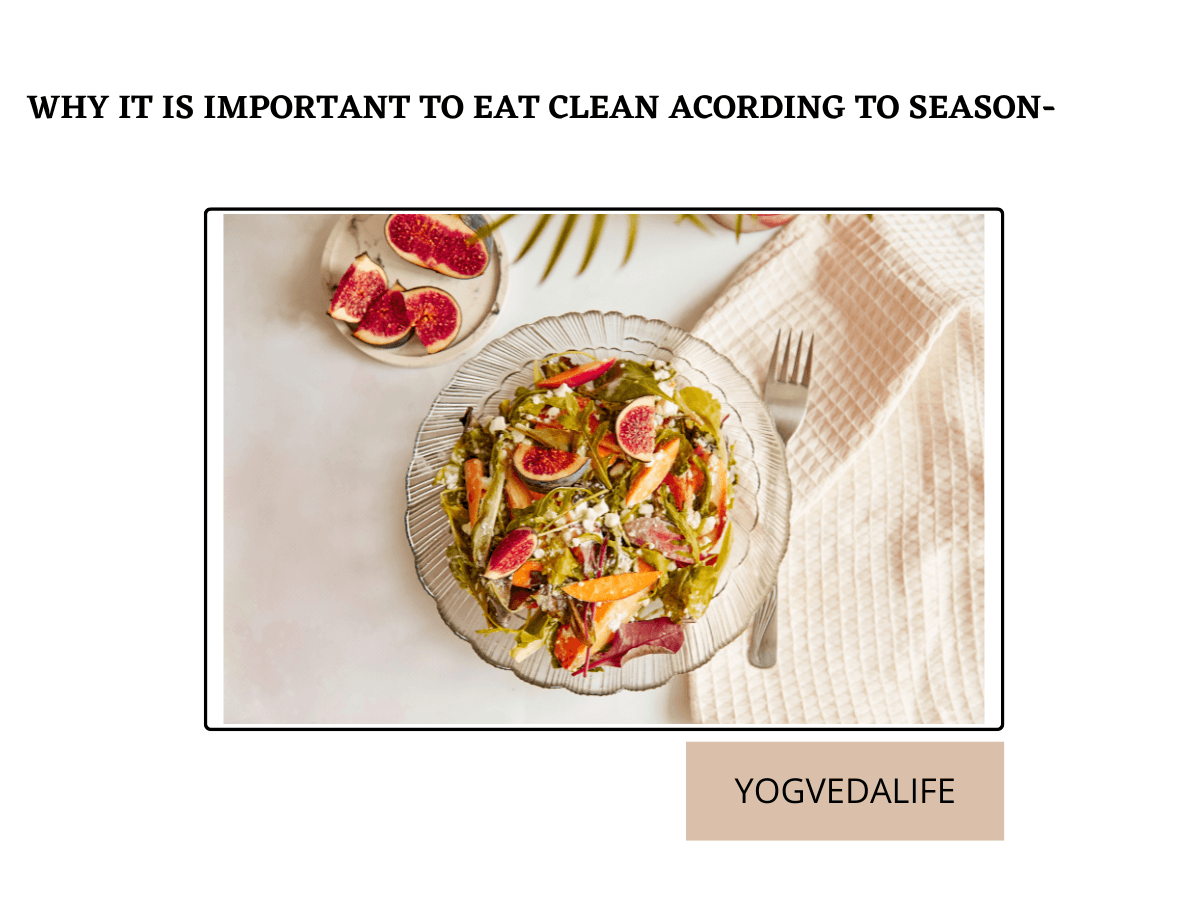In today’s fast-paced world, where processed and packaged foods dominate our diets, clean eating has become more crucial than ever. The food we consume plays a significant role in determining our overall health and well-being. Clean eating is not just a diet but a lifestyle choice that focuses on consuming whole, unprocessed foods to nourish our bodies and minds. By adopting clean eating habits according to the season, we can experience numerous benefits, from improved physical health to enhanced mental clarity and a reduced risk of chronic diseases.
What to eat when
Listen to your body and lifestyle when planning what to eat. Some of us do better with three meals a day, while others prefer smaller portions more often. Make sure you have enough time between meals to relish the feeling of hunger that co-exists with an empty stomach. Routine and regularity are the keys to good nutritional health.
Why breakfast matters

Kickstart the day with a good portion of the nutrients your body needs—without fuel, our body and mind won’t cope with all your demands. Choose foods that offer a constant energy boost: oatmeal, homemade muesli, wholemeal toast, eggs, yogurt with Fruit, nuts, and seeds.
Fresh orange juice

Squeeze it yourself. The fruit should be organic, fairly traded, and not coated in petroleum waxes. Homemade orange juice with pulp is a good source of potassium, folate, vitamin C, and carotenoids. It has been shown to reduce the risk of an inflammatory condition that leads to rheumatoid arthritis by as much as 40 percent.
Go to work on an egg

Eggs are always a good way to start the day for a high-quality protein hit. They contain the antioxidant selenium, choline for memory, and vitamin D, which helps calcium absorption and boosts immunity.
Keep chickens
The best eggs are freshly gathered from your chickens. Even a small urban garden can be home to a couple of hens.
Don’t snack after exercise

A post-workout nutrition bar or glucose drink may seem tempting, but don’t succumb if you want to keep trimming. Have green or camomile tea and an apple instead.
Spice up your life
Buy a book about Indian cuisine, grind your own curry powders and garam masalas, and aim to cook your own once a week. India has the lowest incidence of Alzheimer’s disease in the world. Researchers attribute this to curry, which almost always contains turmeric, the main constituent of which, curcumin, seems to slow the progress of neurodegeneration. It is also an attainable anti-inflammatory for swollen joints and has been associated with healthy cells.
Adopt a Mediterranean diet.

Benefit from this health-enhancing way of eating by building your daily diet around antioxidant-loaded fresh fruit and vegetables, highly nutritious whole grains and nuts, and heart-friendly olive oil and fish.
In a recent study, those who ate Mediterranean for just three months reduced their risk of cardiovascular disease by 15 percent.
Eat with the seasons.
Ayurveda, the Indian system of natural healthcare, is also referred to as the art of longevity. It teaches that body and mind become better balanced if we consume the produce of the seasons. Doing so coordinates us with the rhythms of the natural world, echoing the Earth’s changes as the globe turns.
Spring clean
With the first buds of spring, make changes in your diet and propose foods that are easy to digest. Lighten up by easing back on dairy food and rich, oily meals, and gradually introduce more salads.
Summer foods

In the heat of summer, nature offers juicy fruit and water-laden vegetables to cool and hydrate the body, so take advantage of cucumber, zucchini, celery, watercress, and flush-reducing watermelon. Major on chilled soups, cool juices, and frozen yogurt. Make fresh mixed-leaf salads to keep active bones strong and calm the nerves with their sedative qualities.
Summer salad

Take large bunches of several leafy seasonal herbs, such as mint, parsley, coriander, and sorrel. Wash, chop, and dress with lemon juice, olive oil, salt, and pepper. Slice feta cheese and stir in. Chill before serving.
Fall foods
In the season of change, start eating more sweet, astringent, and bitter-tasting foods, such as pumpkin, beets, and parsnip, suggests Ayurveda. Keep the food light and easily digestible’s not winter yet.
Winter warmers
Ayurveda suggests we build in more sustaining, warming food in winter. Go for cheery casseroles and roast joints, baked dishes based on dried legumes, and root vegetables.
Vegetarian roast

Roast winter vegetables, such as carrots, parsnip, red beets, and whole heads of garlic. Serve topped with grilled goat’s cheese or as wholemeal bread sandwiches.
Waist watching
Enjoying a delicacy early in the day seems to have less effect on the waistline. Alternatively, do more exercise to keep your waist in check.
Try fasting
In all the great religions, fasting is a tool of meditation, used as a way of reining in the excesses of body and mind. If you are in good health, you might like to have a juice-and-water-only day once every season. Alternatively, give up something you crave for a set period, and notice how after a while the cravings cease and your mind feels calmer.
In conclusion, clean eating is a powerful tool for transforming our health and well-being. By making informed choices about the food we eat, we can take control of our bodies and lives. Clean eating is not about deprivation or perfection; it's about nourishing ourselves with whole, nutrient-dense foods that promote vitality and longevity. As we embark on this journey, we can expect to experience a range of benefits, from increased energy and improved digestion to a reduced risk of chronic diseases and a deeper connection with nature. By embracing clean eating, we can unlock our full potential and live a healthier, happier, and more fulfilling life.
ALSO –https://yogvedalife.com/effects-of-eating-naturally/


[…] ALSO- https://yogvedalife.com/why-it-is-important-to-eat-clean-acording-to-season/ […]